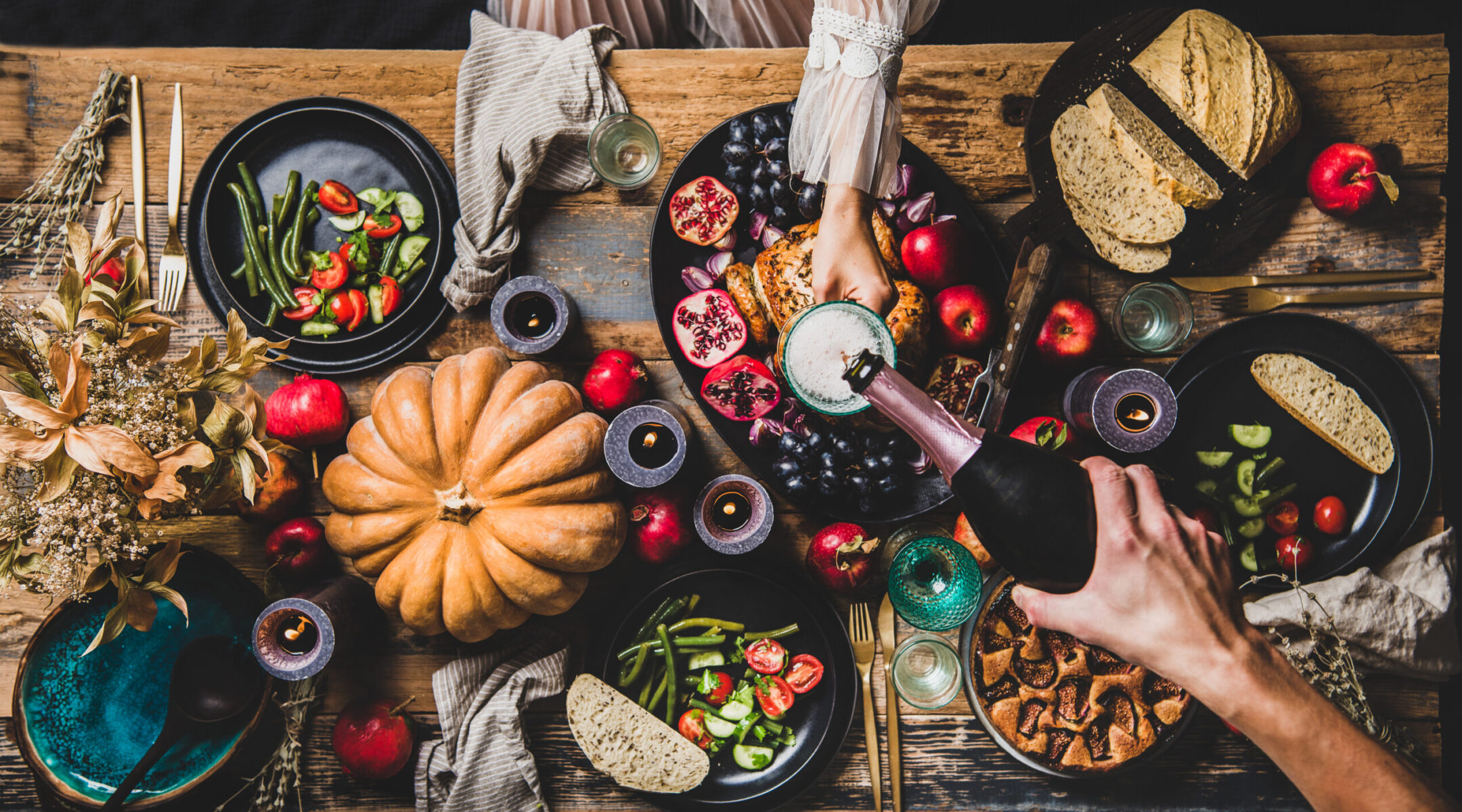(JTA) — While my wife and I were sitting outside during Sukkot, the Jewish harvest festival in the fall, we spent some time reflecting on the fact that we celebrated the major Jewish holidays during the pandemic.
On the one hand, we missed our friends and family at Passover, Shavuot, Rosh Hashanah and Yom Kippur. We missed making memories around tables filled with food and wine. As a rabbi, I missed being with my congregants in person and helping them make meaning of the holidays.
On the other hand, my wife and I made a holiday cycle’s worth of memories just for the two of us. We created experiences that were more tailored and intentional than either of us had experienced in many years. By doing things differently, we got a chance to rethink our traditions.
Tell JTA: What are you grateful for this year? (We know it’s a hard question.)
Now, many of our fellow Americans are about to go through the same experience — if they take heed of public health advice and stay home for Thanksgiving (and Christmas and New Year’s as well). It’s clear that many of them are hesitant to spend a year not making memories with family and friends: Airports are busy, and a recent survey found that as many as 40% of Americans are planning to celebrate together despite the risk of disease.
Jews like me know intimately what we lost through a year of holidays spent alone, and how to get through a tough holiday season. I’m sharing what I learned this year in hopes that it might be helpful for anyone who is deciding whether to stay home for the holidays, or those who have already made the decision but have reservations about it.
Focus on your needs, not on having everything you want.
For every holiday, we have attachments to traditions and experiences. But if we dig deep, we can each find something that really stands out. Making sure we meet that need, we can help ourselves manage these holidays. For us, accustomed to large meals with many guests, we realized that this year, what we needed was simplicity.
Shifting from the pomp and circumstance to something with lower pressure was profound. Instead of focusing on a large meal, we actually talked about the meaning of the holidays. Our Passover Seder, just the two of us, was incredible. We did not have the pressure of trying to make everyone happy, running to the kitchen a million times and the need to end at a certain time. We didn’t have to skip our favorite parts of the Haggadah and instead could follow our curiosity.
We understood that during a year when so many children are attending school online, they needed to engage in the holiday without screens. So, rooted in this need, we decided that our major holiday effort would be creating an activity book for young children.
Look for spiritual rhymes, not repetition.
There is a quote that is wrongly attributed to Mark Twain that I always think about: “History doesn’t repeat itself; it rhymes.” This moment in history demands that we create spiritual experiences that rhyme. It cannot and will not be the same as what we did last year or even every year since the last global pandemic. How can we create powerful moments that meet our needs in a new way?
Some synagogue communities, understanding that celebratory dancing traditional on Simchat Torah cannot be approximated by Zoom, created parades around their neighborhoods instead of in their sanctuaries. This rhymed with the traditional experience but met the need in a new way. They still celebrated, and the day was still full of joy, but the ritual was done in a safe and distanced way.
Embrace the idea of a “holiday season.”
There is a reason we call it a holiday season. The preparation, the anticipation, the holiday itself and what happens afterward all make a difference. By thinking of the entire season and the variety of experiences we can have, we can lower the pressure and expectations for the few hours of the prayer or communal experience. This is ultimately good for everyone because it is challenging to have a meaningful moment if the pressure is so high. How can the week before the holiday be meaningful? The week afterward?
The Jewish fall holiday season is nearly two months long. A month of spiritual preparation, a few weeks of serious prayer and reflection and then a week of outdoor celebrations. How can we (safely) parcel out different smaller moments rather than bottling up everything into a few moments?
We might think that this will just cause us more pain, to constantly be reminded of what we’re missing. Instead, I found that I appreciated always having something to look forward to. Anticipation can be as powerful as the experience itself. I looked forward to the wonderful Rosh Hashanah meals with my wife and talking with her a week later about the powerful imagery of Yom Kippur. Then a week after that came the relief of relaxing outdoors. Each week brought something lovely, no matter how small.
Zoom isn’t the only tool for creating a meaningful holiday experience.
One of the most important things to recognize is the various contexts in which we engage with the myriad of opportunities available to us. Each one can meet a few of our needs, but it is unlikely that one will do the whole thing. Virtual and in-person experiences touch us differently. Synchronous and asynchronous learning and celebrations give us the power to choose our timing. In-person walks in the park to do Tashlich, prerecorded videos, live Zoom services and the above-mentioned activity book are all opportunities we offered for Rosh Hashanah as we reflected on the many ways to engage this year.
For so many families right now, gathering in front of a screen at the same time as everyone else may not be feasible — or it may be too potent a reminder of what the pandemic has taken from us. Finding quiet moments watching recordings, reading small spiritual nuggets and listening to meaningful music are all avenues we can take. If we broaden the ways we engage, we might find something that works wonders.
You have the tools for a meaningful holiday in your home.
This one might seem obvious, but it isn’t. We may or may not have a Bible, prayer book or other ritual items accessible to us, but there will be many technical solutions available that allow us to participate in prayer services around the world.
At the end of the day, we have so many tools in our own home to provide meaning. A scavenger hunt for objects that remind us of good times can be a religious moment. Coloring a picture of holiday symbols, reading a story and even playing holiday trivia could lead to shared, heartening moments.
Throughout the holidays, we used special ritual items and gifts. We talked about the people who loved us, whose presence we wished for; with our intention we brought them with us. I have my great-grandfather’s Passover matzah covers and we shared stories of holidays past. We reveled in the silly memories and fun moments. For Sukkot, we used our Steelers’ outdoor chairs in the sukkah, reflecting on our time here in Pittsburgh.
It won’t be ideal, but it will have to be enough for now.
This year won’t feel like it is enough. We were not designed to be distant like this. Technology certainly has its advantages, with lessons learned and valuable experiences that can be had distantly like never before. But in the end, this isn’t what most people want or need. Our Passover Seder for two was innovative and meaningful, and it served us this year, but it’s not one we wish to repeat.
Being in this circumstance requires each of us to take more ownership than ever over our holiday experiences. We must take them personally! No matter how much they try, our institutions cannot do it for us. If we don’t find meaning in front of a screen, we have to work that much harder, no matter how good the video or audio.
But together, if we think creatively for our congregants, partners, children, parents and families, it is possible to create meaningful moments. The Jewish tradition emphasizes the power of elevating mundane moments with blessings and intentionality. As we sit separated at home, consecrating the fleeting is more important than ever.
JTA has documented Jewish history in real-time for over a century. Keep our journalism strong by joining us in supporting independent, award-winning reporting.







